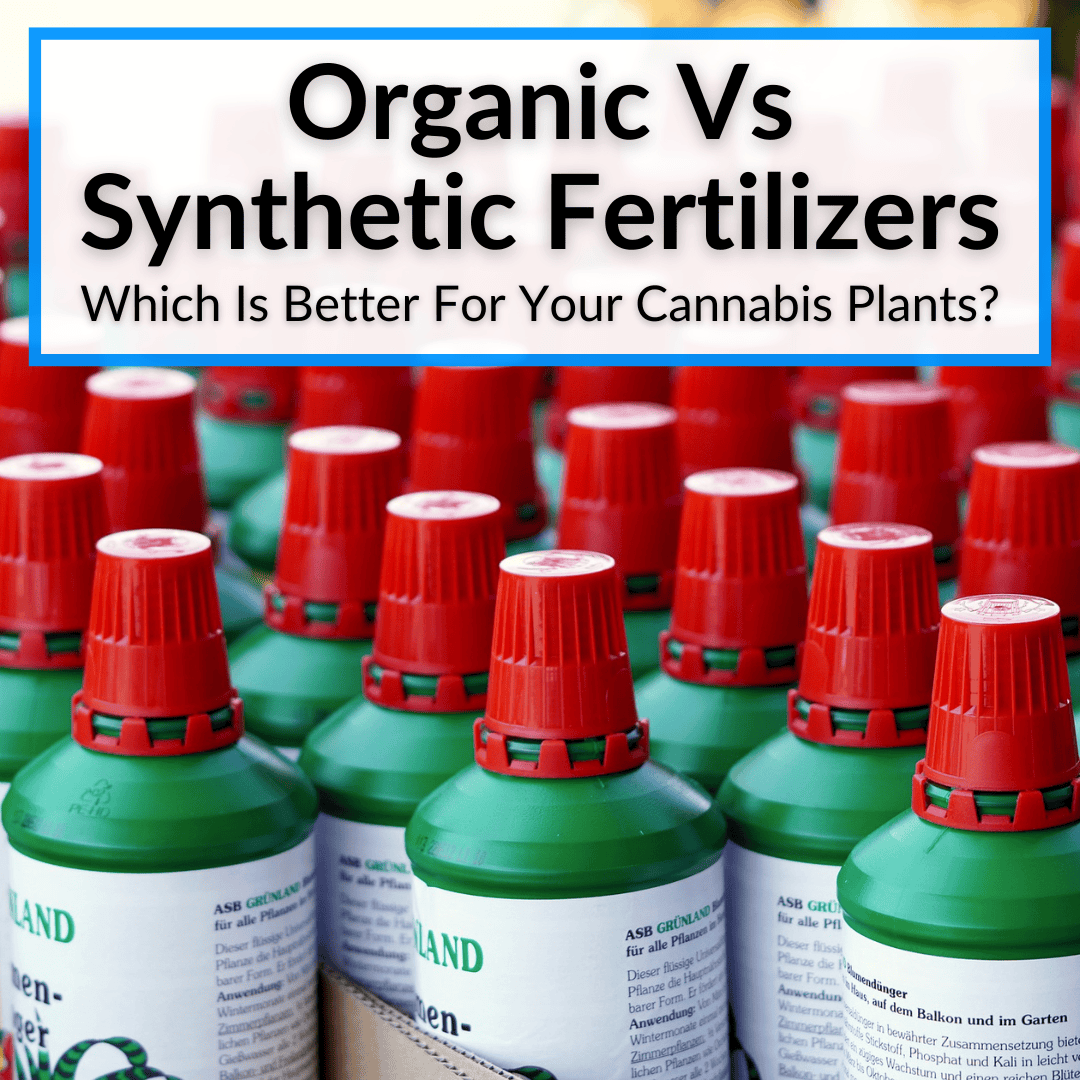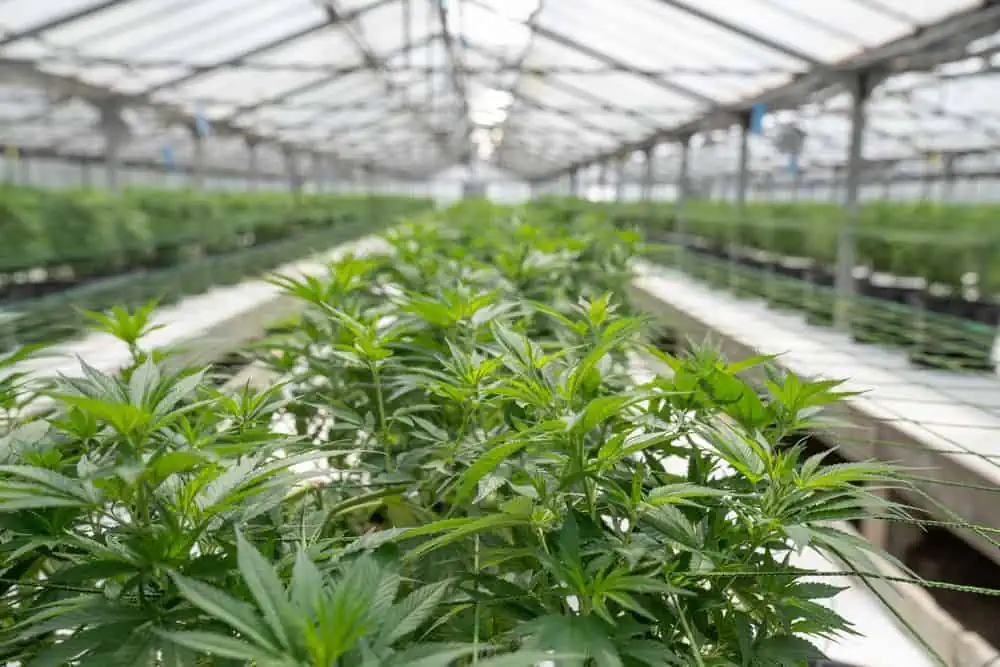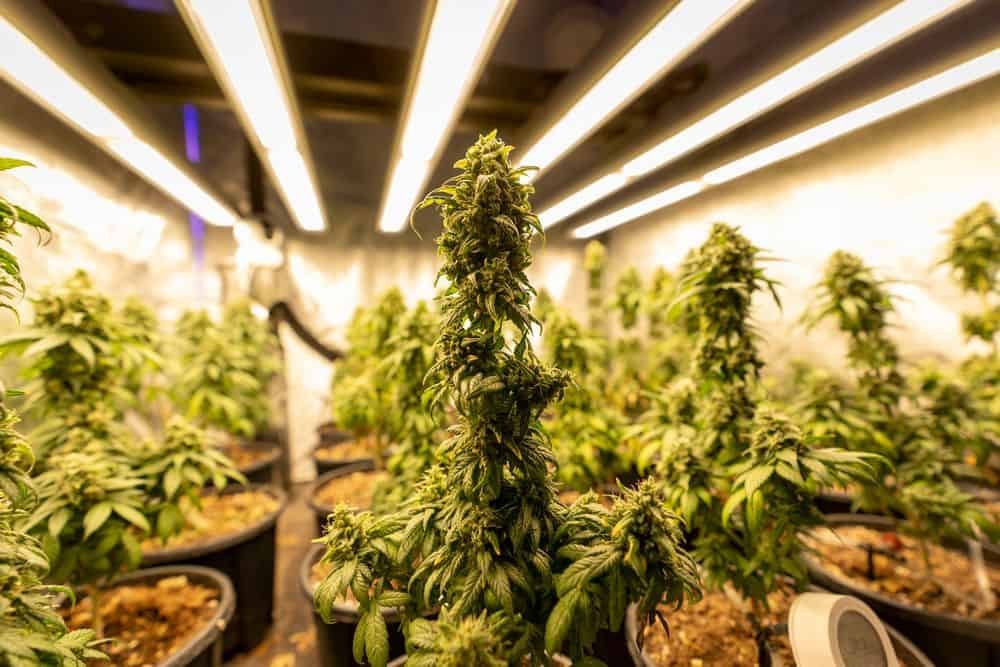 Weed plants need to eat.
Weed plants need to eat.
At least if you want them to grow strong and provide a large yield of tasty buds.
What do they eat? Nutrients provided by fertilizers.
And as growers, we have two options: organic vs synthetic fertilizers.
Naturally, most people probably assume organic is better.
But that is not necessarily the case.
We’re going to compare the two types of fertilizer in detail, to help you figure out which type is best for you and your plants.
Contents
- 1 Organic Vs Synthetic Fertilizers
- 2 Synthetic Vs Organic Fertilizers: Final Thoughts
Organic Vs Synthetic Fertilizers
We will begin our comparison of synthetic and organic fertilizers for weed, by looking at each type individually. Then we will compare them directly and examine the advantages and drawbacks of each type.
What Is An Organic Fertilizer?

Organic fertilizers for cannabis plants are made from ingredients solely of plant or animal origin. They do not contain any synthetic or chemically formulated ingredients.
Some examples include bat guano, seaweed, fish meal, manure, vermicompost, coffee grounds, eggshells, humus, wood ashes, etc.
The use of organic fertilizers for growing marijuana plants makes a big difference in the buds’ taste and quality. Organic fertilizers produce plants that are free of toxins and have a higher vitamin content.
They not only taste and smell better but the highs they produce are also enhanced. Many growers believe that organic fertilizers produce a satisfying yield of better-tasting and healthier buds than their chemically-grown cousins.
Furthermore, the entire growing process becomes more plant-friendly, people-friendly, and earth-friendly.
What Is A Synthetic Fertilizer?

Synthetic fertilizers for cannabis are man-made or inorganic compounds generally derived from the petroleum industry. They provide all the nutrients the plants need in a convenient and precise manner.
Examples of synthetic fertilizers are potassium sulfate, ammonium phosphate, and ammonium nitrate.
Synthetic fertilizer products are formulated with a specific ratio of nutrients that is tailored to meet the needs of cannabis plants in different growth stages.
They are especially convenient for hydroponic growers thanks to their tendency to dissolve fully and prevent clogs in hydroponic systems.
Growers who use synthetic fertilizers love them for their more precise application, cost-effectiveness, and quicker rate of absorption by the plants.
Differences Between Organic And Synthetic Fertilizers
There are several differences between organic and synthetic fertilizers for cannabis. Knowing these differences will help you in understanding cannabis nutrients better.
Cost

Most home-based and commercial growers prefer synthetic fertilizers over organic ones for their lower costs.
Depending on the type, most organic fertilizers are more expensive than synthetic ones because their macro and micro-nutrients are lower in concentrations.
This means you need to reapply organic fertilizers over and over. They also, usually, come in small packet sizes, meaning you need to buy more.
On the other hand, liquid synthetic fertilizers have concentrated micro and macro-nutrients and usually end up being a lot cheaper for growers growing multiple plants at a time. They are also available in varying package sizes to suit the needs of large farmers.
It is important to note that certain organic fertilizers,, like compost, worm casting, and manure are sometimes cheaper than their synthetic counterparts, because they are nutrient-rich and help feed the plants over extended periods.
Furthermore, when you use organic fertilizers, you can reuse the soil after every grow, which translates into huge savings for growers with multiple harvests.
Ease Of Use
Unlike organic fertilizers, synthetic fertilizers list specific nutrient ratios on their labels. This ensures precise control over plant nutrition. They are especially flexible and versatile for traditional soil-based and advanced hydroponic systems.
Consistency
Organic fertilizers often lack consistency. The amount of nutrients they contain can vary. On the other hand, synthetic fertilizers have defined amounts of nutrients and tend to be more consistent in their nutrient values.
Rate Of Nutrient Release

In the case of organic fertilizers, the rate of nutrient release is optimal for plant intake. With synthetic fertilizers, the nutrients are released rapidly and, in some cases, can be excessive (overfertilizing) for the plants.
Safety And Effects On ‘The Environment
Organic fertilizers are relatively more risk-free for the plants, the soil, and the environment. They usually do not cause root burn and help keep the soil healthy. They also have a minimal risk of polluting the air and water.
Synthetic fertilizers contain high amounts of salts that can burn plant roots. They also have a deleterious effect on the soil’s microbiology and chemical structure. They could even leach into the air and waterways, resulting in greenhouse gas emissions.
Similarities Between Organic And Synthetic Fertilizers
There are also a number of similarities between synthetic and organic fertilizers.
Nutrient Provision
Both organic and synthetic fertilizers aim to enhance plant growth, increase yields, and improve overall plant health. They both provide the necessary nutrients for the cannabis plants, such as nitrogen, phosphorus, and potassium
Organic and synthetic fertilizers can both amend the soil to improve its fertility and structure, although organic fertilizers also contribute to soil organic matter.
Both types of fertilizers can be formulated to provide specific nutrient ratios tailored to different stages of cannabis growth, from vegetative to flowering stages.
Application Methods
Organic and synthetic fertilizers can be applied using similar methods, such as broadcast on the surface, sprayed on the plant, tilled or watered into the soil, or applied in a narrow band on or beneath the surface.
Compatibility With Growing Systems

Both organic and synthetic fertilizers are compatible with different types of cannabis growing systems, such as soil-based, hydroponic, and soilless media.
Advantages Of Organic Fertilizers
Organic fertilizers offer several advantages for cannabis cultivation.
First, they improve soil fertility by enhancing the soil’s organic matter, which fosters a healthy microbial ecosystem. This improved soil structure leads to better water retention and ensures that the cannabis plants receive consistent moisture.
Additionally, organic fertilizers provide a balanced, slow-release nutrient profile, promoting complete nutrient uptake without stressing the plants or risking overfertilization.
Most importantly, organic fertilizers are free from synthetic chemicals and toxins, ensuring that no harmful substances leach into the soil, water, or air.
This eco-friendly approach not only supports plant health but also protects the surrounding environment, contributing to sustainable cultivation practices.
Some cannabis growers believe that the use of organic fertilizers enhances the aroma, taste, flavor, and even the ‘highs’ of their buds.
Advantages Of Synthetic Fertilizers
Synthetic fertilizers offer several advantages for cannabis cultivation.
Firstly, they are easier to use and apply and they provide faster and more targeted outcomes compared to organic fertilizers.
Growers benefit from precise control over nutrient ratios, since synthetic fertilizers allow them to tailor fertilization to the specific needs of their cannabis plants at different growth stages.

Synthetic fertilizers also come in varying packages, which makes them suitable for large-scale cultivation. They may even end up being cheaper than certain organic fertilizers.
Additionally, synthetic fertilizers offer consistency in nutrient content, ensuring that plants receive a reliable supply of essential nutrients every time they are applied.
This predictability and precision make synthetic fertilizers a preferred choice for many growers seeking optimal plant performance and high yields.
Synthetic Vs Organic Fertilizers: Final Thoughts
Both organic and synthetic fertilizers have their place in cannabis cultivation, each with distinct advantages and drawbacks.
Organic fertilizers are derived from natural sources and offer benefits such as improved soil health, environmental friendliness, and potentially enhanced flavor and quality of the final product. They are particularly appealing to growers focused on sustainable and eco-friendly practices.
Synthetic fertilizers provide precise nutrient ratios, consistency, and cost-effectiveness, making them attractive for large-scale operations and hydroponic systems. They offer faster nutrient uptake and more targeted feeding options.
The choice between organic and synthetic fertilizers ultimately depends on your priorities, cultivation method, scale of operation, and desired end product.
Many successful cannabis cultivators also opt for a balanced approach, combining both types of fertilizers to maximize the benefits of each while mitigating their respective drawbacks.
Regardless of the choice, proper application and understanding of plant needs remain crucial for achieving optimal growth and yield in cannabis cultivation.
Leave a Reply